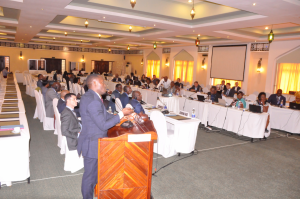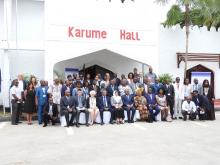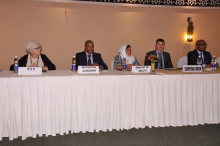WHO and partners meet to reflect on progress made in expanding access to medicines through the EC/ACP/WHO Renewed Partnership Project
To address some of the access barriers of pharmaceuticals sector in sub-Saharan Africa, the European Union (EU) invested Euro 10 million into a four-year effort to boost the pharmaceutical system in 15 sub-Saharan African countries which participated in the meeting through the EC/ACP/WHO Renewed Partnership Project. The Renewed Partnership is an alliance between the Caribbean and Pacific Group of States (ACP), the European Commission (EC), and the World Health Organization (WHO).
The partnership focused on improving the pharmaceutical systems by:
- Strengthening policies for the selection, dispensing and use of essential medicines
- Increasing the availability of medicines and reducing medicines prices
- Promoting quality and safety of medicines
- Promoting good governance in the pharmaceutical sector
With the project coming to an end, WHO and partners convened for 3 days in Zanzibar to take stock of progress made in expanding access to medicines for their populations and progressing towards universal health coverage. The meeting was officially opened the Principal Secretary of the MOH, Ms. Asha Ali Abdulla who in her opening remarks informed on the benefits the United Republic of Tanzania and Zanzibar have realized through this partnership. She sighted, medicines policy, Post Marketing Surveillance Guidelines for essential medicines and support to the regulatory authorities as few concrete examples of the benefit of the partnership. Dr. Suzanne Hill, the Director of EMP highlighted some of the achievements of the partnership in different countries, but reiterating that there are still challenges that need to be tackled to ensure UHC.
Other speakers included the delegate from European Union and the Assistant Secretary General of ACP.
On behalf of Dr. Matthieu Kamwa, WR Tanzania, Dr. Ghirmay Andemichael, PHA Zanzibar sub-office presented the WCO remarks for the occasion and recognized the contribution of the EU/ACP/WHO partnership to the improvement of the pharmaceutical systems and access to essential medicines in the participating countries and called for renewed commitment and stronger partnership to ensure attainment of Sustainable Development Goal and Universal Health Coverage to all. He also reaffirmed WHO’s commitment to continue to work with partners and stakeholder to sustain the gains made and further strengthen the pharmaceutical system to improve access to quality assured medicines in countries.
The following are among the recommendations of the meeting:
- Ensure sustainability of the project achievements and continue partnership for further enhancement of the pharmaceutical systems in Africa.
- Prioritize work around regulation and access focusing, in particular, on governance, fight against propagation of substandard and falsified medical products, strategic communications and medicines pricing data
- Create a platform for Regional Economic Communities to discuss common approaches, share experiences and best practices
- Support Member States in creating a publicly available framework for monitoring pharmaceutical expenditures in the context of devolved/decentralized governance models
- Focus implementation, enforcement and evaluation of the national policies for regulation, pricing and cost containment
- Support Member States in monitoring and evaluating the performance of pharmaceutical systems to inform appropriate decisions and actions
- Elaborate guidance documents for public Central Medical Stores with appropriate legal and accountability frameworks to improve performance and governance
On the way forward, participants prioritized some activities for short and long term implementation in areas such as local manufacturing, post-marketing surveillance and Substandard/ Falsified product counteraction, procurement and supply, AMR and Governance among others.
About 60 participants including delegates from 15 ACP countries, the Regional Economic Communities, partners and WHO staff from the Headquarter, Regional and Country Offices and members of the media attended the meeting.
[1] The Countries represented were; Burundi, Cameroon, Congo, Democratic Republic of Congo, Ethiopia, Ghana, Guinea, Kenya, Mali, Mozambique, Senegal, Tanzania, Togo, Zambia, and Zimbabwe






